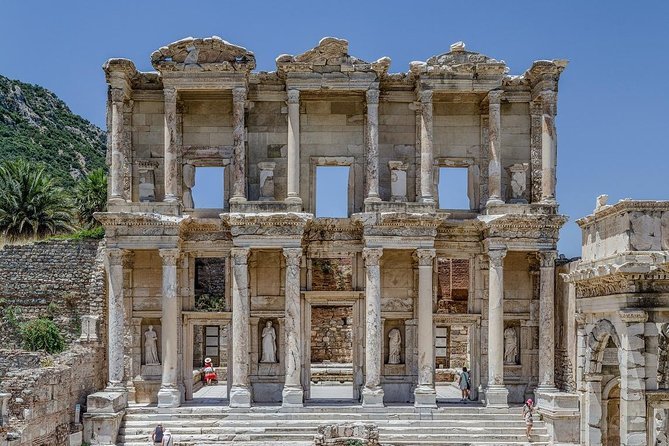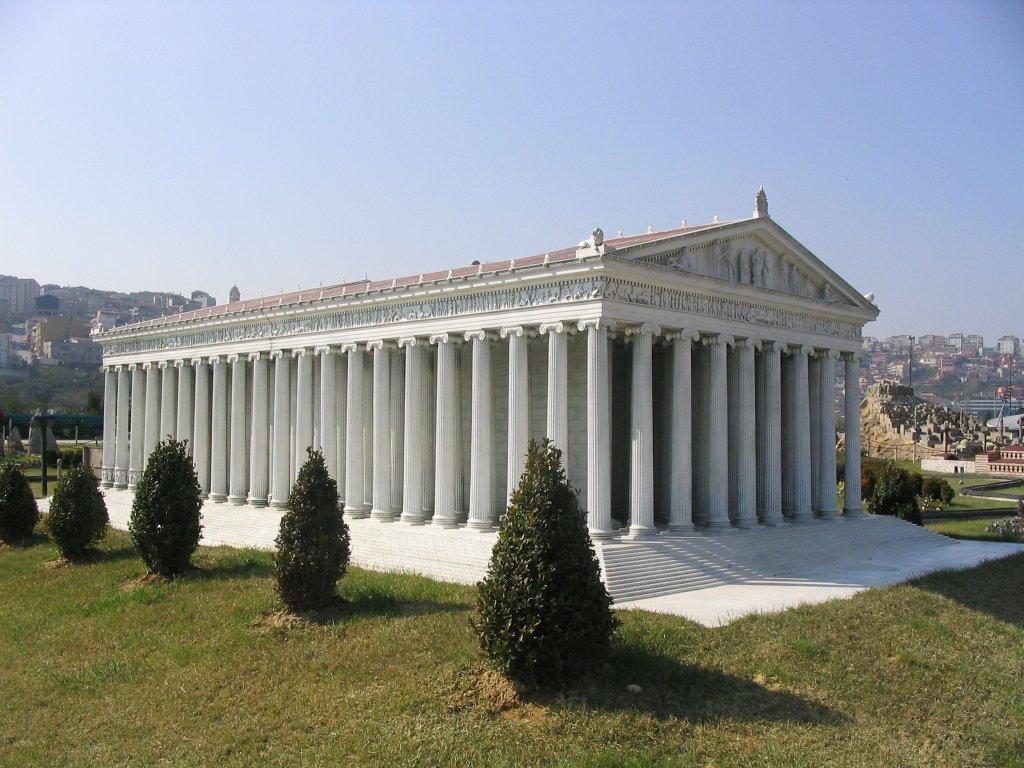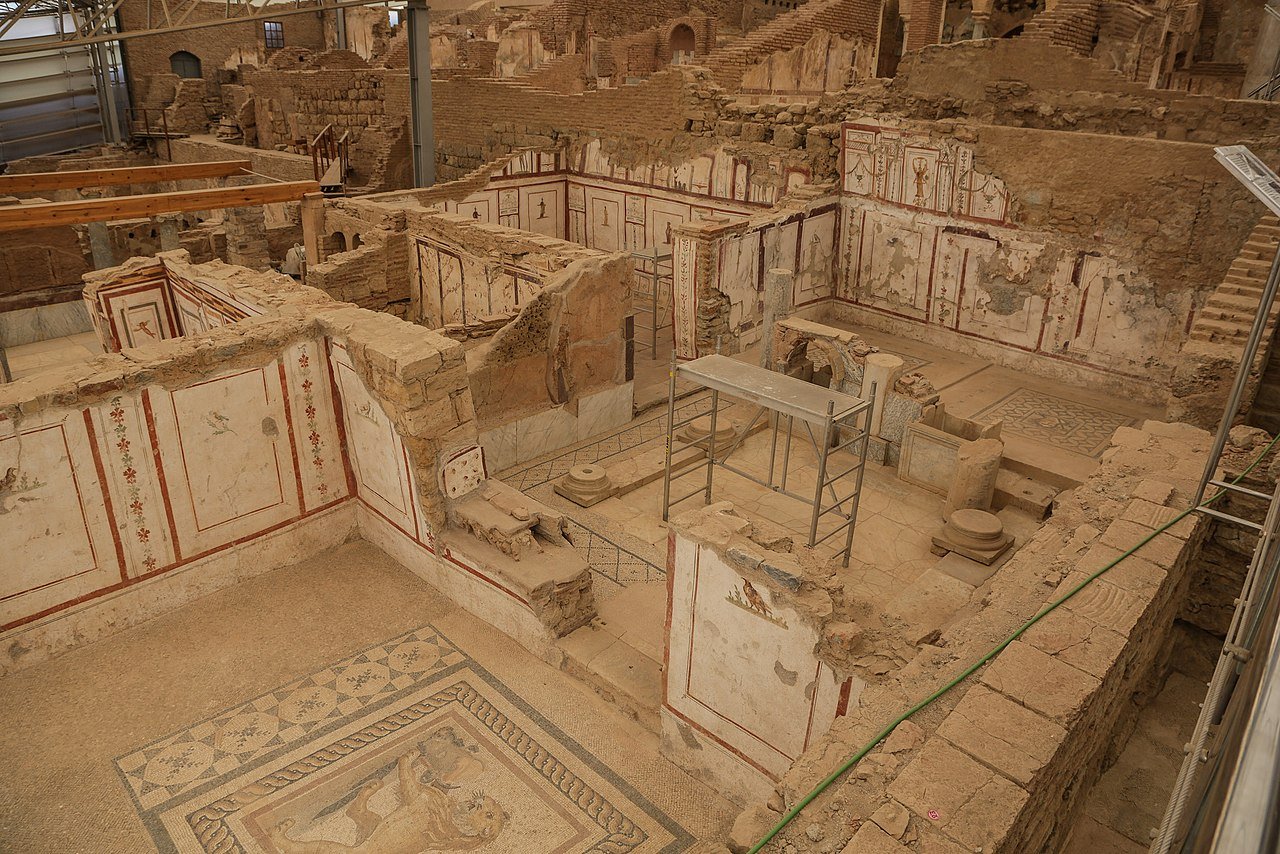Memory text: With all wisdom and understanding, He made known to us the mystery of his will according to his good pleasure, which he purposed in Christ, to be put into effect when the times reach their fulfillment—to bring unity to all things in heaven and on earth under Christ. In him we were also chosen, having been predestined according to the plan of him who works out everything in conformity with the purpose of his will, in order that we, who were the first to put our hope in Christ, might be for the praise of his glory. Eph. 1:8-12
In the First Century, Ephesus was the capital of the Roman Province of Asia, what we call Asia Minor, Anatolia, or mainland Turkey. It was a large, cosmopolitan city of about 250,000, the fourth largest city in the Roman empire.
Artemis - Diana - Wikipedia Commons
Ephesus was settled by the Greeks in the seventh century BC. According to myth it was founded by Amazon queens, and named after Amazon queen Ephesia. Under King Croesus (585-546 BC, an extremely wealthy king—hence the expression “rich as Croesus”)—construction began on the great Temple of Artemis, one of the Seven Wonders of the Ancient World. Artemis became the patron deity, or protector goddess, of Ephesus; Artemis was the goddess of the hunt, the wilderness, wild animals, nature, childbirth, care of children, especially female children, and chastity. Diana is the Roman version of Artemis.
“The city was famed for the worship of the goddess Diana and the practice of magic. Here was the great temple of Diana, which was regarded by the ancients as one of the wonders of the world. Its vast extent and surpassing magnificence made it the pride, not only of the city, but of the nation. Kings and princes had enriched it by their donations. The Ephesians vied with one another in adding to its splendor, and it was made the treasure-house for a large share of the wealth of Western Asia.” Sketches from the Life of Paul, p. 134.3
In 129 BCE, the Romans took Ephesus from the king Attalos of Pergamon. The Library of Celsus, its ruins still magnificent today, made Ephesus a center of learning and philosophy. The great theater, which could accommodate 25,000 spectators, was the largest in the Roman world. This enormous theater was at the center of the events related in Acts 19.
Paul visited Ephesus on his second missionary journey, which took place around 52 AD, speaking to the Jews in their synagogue:
“And he came to Ephesus, and left them there; but he himself entered the synagogue and reasoned with the Jews. When they asked him to stay a longer time with them, he did not consent, but took leave of them, saying, ‘I must by all means keep this coming feast in Jerusalem; but I will return again to you, God willing.’ And he sailed from Ephesus.” Acts 18:19-21.
Ruins of the Library of Celsus, Ephesus - Wikipedia Commons
On his third missionary journey, when Apollos went to Corinth, in Greece, Paul traveled west through the interior of Anatolia and arrived at Ephesus, immediately re-baptizing twelve believers. For three months, Paul preached the gospel to the Jews in the synagogue, but eventually they rejected him. Then Paul began preaching in the lecture hall of Tyrannus, continuing to preach Christ there for two years. Scripture records that “all the Jews and Greeks who lived in the province of Asia heard the word of the Lord.”
“The Preaching of Saint Paul at Ephesus,” Eustache LeSueur (French), 1649
Miracles were worked, demons cast out, “the name of the Lord Jesus was held in high honor.” But when some non-believing Jews tried to cast out demons in the name of Jesus and Paul, they were soundly thrashed. It thus became very clear that the miracles and exorcisms Paul was working were not magic, but manifestations of the one true God.
A number of the new Christian believers had been hedging their bets, holding on to extremely expensive magic books, books that purported to interpret the words inscribed in mystic characters and symbols on the statue of the goddess Artemis; it was believed that when these words were uttered aloud, they could miraculously guard against theft, disease, and even death. But now these magic manuals were relinquished; their owners brought them out and burned them publicly.
A model of the third temple of Artemis-Diana at Ephesus
“When they calculated the value of the scrolls, the total came to fifty thousand drachmas [at least $5 million dollars in today’s money]. In this way the word of the Lord spread widely and grew in power.”
Thanks to Paul’s prolonged stay in the city, Ephesus became a very important center of early Christianity, the largest Christian community in the Roman Empire.
As Christianity increased, idolatry decreased, and the makers of the idols felt threatened. The surest way to bring wrath down upon yourself is to come between people and their source of income. This principle is still in operation today.
A silversmith named Demetrius, who made a good living making figurines of Artemis/Diana and miniature models of her temple, decided it was time to put a stop to Christianity and the threat it posed to his income:
“About that time there arose a great disturbance about the Way. A silversmith named Demetrius, who made silver shrines of Artemis, brought in a lot of business for the craftsmen there. He called them together, along with the workers in related trades, and said: ‘You know, my friends, that we receive a good income from this business. And you see and hear how this fellow Paul has convinced and led astray large numbers of people here in Ephesus and in practically the whole province of Asia. He says that gods made by human hands are no gods at all. There is danger not only that our trade will lose its good name, but also that the temple of the great goddess Artemis will be discredited; and the goddess herself, who is worshiped throughout the province of Asia and the world, will be robbed of her divine majesty.’”
The Great Theater at Ephesus, scene of the events of Acts 19.
This speech touched off a riot, and the rioters seized Gaius and Aristarchus, Paul’s traveling companions from Macedonia, and took them to the Great Theater. Paul wanted to go to the theater and speak to the crowd, but the disciples knew it was too dangerous and would not let him go. Even some of the local government officials strongly urged Paul not to risk entering the theater.
Finally, after several hours, the city recorder quieted the crowd and spoke sense to them, urging them to disburse and pursue normal legal process against Paul, if they had a case to make:
The Great Theater at Ephesus, where the rioters of Acts 19 chanted “Great is Artemis of the Ephesians” for hours, until an official told them to go home.
“Fellow Ephesians, doesn’t all the world know that the city of Ephesus is the guardian of the temple of the great Artemis and of her image, which fell from heaven? Therefore, since these facts are undeniable, you ought to calm down and not do anything rash. You have brought these men here, though they have neither robbed temples nor blasphemed our goddess. If, then, Demetrius and his fellow craftsmen have a grievance against anybody, the courts are open and there are proconsuls. They can press charges. If there is anything further you want to bring up, it must be settled in a legal assembly. As it is, we are in danger of being charged with rioting because of what happened today. In that case we would not be able to account for this commotion, since there is no reason for it.”
The fact that the city officials were on Paul’s side is a testament to his character and the Christian message he preached:
“Several of the most honorable and influential among the magistrates sent him an earnest request not to venture into a situation of so great peril. This proof of the regard in which Paul was held by the leading men of Asia was no mean tribute to the sterling integrity of his character.” Sketches from the Life of Paul, p. 144.1
“The decision of the recorder and of others holding honorable offices in the city, had set Paul before the people as one innocent of any unlawful act. This was another triumph of Christianity over error and superstition. God had raised up a great magistrate to vindicate his apostle, and hold the tumultuous mob in check” Sketches, p. 146.2
Paul stayed in Ephesus for over two years, from 53 to 55 AD. The letter to the Ephesians was likely written while Paul was under house arrest in Rome, between 60 and 62 AD. Paul’s “prison letters,” written during this time in Rome when Paul was awaiting an audience before Emperor Nero, include Ephesians, Philippians, Colossians and Philemon; they are the most intensely spiritual of all Paul’s epistles. Paul’s letter to Philemon, although very brief and personal, demolishes the worldview underlying slavery.
Without further ado, we dive into Ephesians:
Multi-level home of a wealthy resident of Ephesus
“Praise be to the God and Father of our Lord Jesus Christ, who has blessed us in the heavenly realms with every spiritual blessing in Christ. For he chose us in him before the creation of the world to be holy and blameless in his sight. In love he predestined us for adoption to sonship through Jesus Christ, in accordance with his pleasure and will—to the praise of his glorious grace, which he has freely given us in the One he loves. In him we have redemption through his blood, the forgiveness of sins, in accordance with the riches of God’s grace that he lavished on us. With all wisdom and understanding, he made known to us the mystery of his will according to his good pleasure, which he purposed in Christ, to be put into effect when the times reach their fulfillment—to bring unity to all things in heaven and on earth under Christ. In him we were also chosen, having been predestined according to the plan of him who works out everything in conformity with the purpose of his will, in order that we, who were the first to put our hope in Christ, might be for the praise of his glory.”
So does Scripture teach predestination? Yes, it does teach the good kind of predestination, which is that God has predestined us to everlasting life. He predestined us for adoption to sonship through Jesus Christ, meaning that He predestined us to be sons and daughters of God. God wants us all to be saved. (John 6:40; 2 Peter 3:9; Ezek. 33:11; 1 Tim. 2:3-4)
When God predestines us to salvation, He doesn’t just want us to be saved or hope we’ll be saved. God has made careful plans and provisions for us to be saved, at the center of which is the death of His own Son, provisions not fully within our present comprehension but which will be our study in eternity. (John 3:16; Rom. 5:8; Eph. 2:7; Maranatha, p. 365) God started planning to save us “before the foundation of the earth.” (1 Peter 1:19-20; Rev. 13:8) We were predestined in Christ “according to the plan of Him who works out everything in conformity with the purpose of His will.”
And God hasn’t just predestined us to be saved, He has predestined specific “works for us to walk in.” “For we are God’s handiwork, created in Christ Jesus to do good works, which God prepared in advance for us to do.” Eph. 2:10. God has planned our life mission in advance; knowing us, knowing our background, our temperament, our education, and our life experiences—knowing all these things, God has placed before us exactly what He wants us to do. All we have to do is do it.
“And you also were included in Christ when you heard the message of truth, the gospel of your salvation. When you believed, you were marked in him with a seal, the promised Holy Spirit, who is a deposit guaranteeing our inheritance until the redemption of those who are God’s possession—to the praise of his glory. For this reason, ever since I heard about your faith in the Lord Jesus and your love for all God’s people, I have not stopped giving thanks for you, remembering you in my prayers. I keep asking that the God of our Lord Jesus Christ, the glorious Father, may give you the Spirit of wisdom and revelation, so that you may know him better.”
We do not have to wait for heaven to be with God. Isn’t that good news? God will be with us, right here in this world, right now, in the person of the Holy Spirit. (John 14:16-17, 26; 15:26;1 John 5:6-8) We are promised that Holy Spirit will abide in those who love God and obey His commandments. ( Acts 5:32;1 John 3:24) We do not invite the Spirit often enough into our lives and work; we should strive, by constant prayer and obedience, for the indwelling of the Spirit.
I pray that the eyes of your heart may be enlightened in order that you may know the hope to which he has called you, the riches of his glorious inheritance in his holy people, and his incomparably great power for us who believe. That power is the same as the mighty strength he exerted when he raised Christ from the dead and seated him at his right hand in the heavenly realms, far above all rule and authority, power and dominion, and every name that is invoked, not only in the present age but also in the one to come. And God placed all things under his feet and appointed him to be head over everything for the church, which is his body, the fullness of him who fills everything in every way.
“Open the eyes of my heart, Lord” goes a familiar praise song, making the same request of God that Paul makes on behalf of the Ephesians. Paul is praying for us to have, and be governed by, spiritual discernment. This means to think, to judge, and to act not by the carnal mind but rather by the Spirit of God quickening our thoughts and sanctifying our emotions and desires.
The power available to every believer, Paul tells us, is the same power that raised Christ from the dead and elevated him “far above all rule and authority, power and dominion, and every name that is invoked, not only in the present age but also in the one to come.” We need only take hold of that power by faith. God is “able to do immeasurably more than all we ask or imagine, according to his power that is at work within us.” Eph. 3:20.








